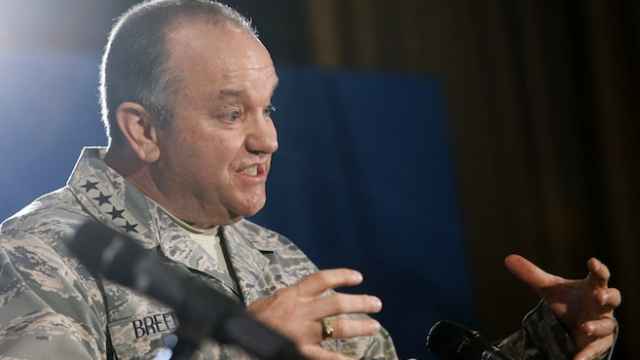NATO's top commander in Europe said Wednesday that alliance nations must be willing to share their intelligence faster if its new rapid-reaction force is to be effective in countering threats.
"Now we only share our intelligence well when we are scared," U.S. General Philip Breedlove told a conference in the Netherlands.
NATO defense ministers agreed last month to create a quick-reaction force of 5,000 troops to meet challenges from Russia and Islamic extremists.
But Breedlove said that for the force to be quickly and effectively deployed it needs strong intelligence.
"So we have to change our culture of intelligence sharing so that we have a high level of sharing to understand and develop indications and warnings so we can see the problem before it happens," he said.
Breedlove said Russia has shown it can quickly deploy its forces.
Recent military maneuvers "demonstrate a clear Russian capability to use their in-place forces without major mobilization preparation and move them quickly and decisively in large numbers," he warned.
President Vladimir Putin said Tuesday that the recent Russian military exercise marked the beginning of a series of such drills this year, a show of force that comes amid a bitter strain with the West over Ukraine.
Last week's Russian maneuvers that spread from the Arctic to the Black Sea involved 80,000 troops, about 100 navy ships and more than 220 aircraft.
NATO exercises are smaller by comparison.
On Saturday, U.S. air defense troops trained rapid deployment of Patriot missile launchers in Poland as part of a weeklong exercise.
Some 100 U.S. troops and 30 vehicles from the 5th Battalion of the 7th Air Defense Regiment traveled to Sochaczew this week from Germany, where they are stationed, to train with Polish troops.
A Message from The Moscow Times:
Dear readers,
We are facing unprecedented challenges. Russia's Prosecutor General's Office has designated The Moscow Times as an "undesirable" organization, criminalizing our work and putting our staff at risk of prosecution. This follows our earlier unjust labeling as a "foreign agent."
These actions are direct attempts to silence independent journalism in Russia. The authorities claim our work "discredits the decisions of the Russian leadership." We see things differently: we strive to provide accurate, unbiased reporting on Russia.
We, the journalists of The Moscow Times, refuse to be silenced. But to continue our work, we need your help.
Your support, no matter how small, makes a world of difference. If you can, please support us monthly starting from just $2. It's quick to set up, and every contribution makes a significant impact.
By supporting The Moscow Times, you're defending open, independent journalism in the face of repression. Thank you for standing with us.
Remind me later.





